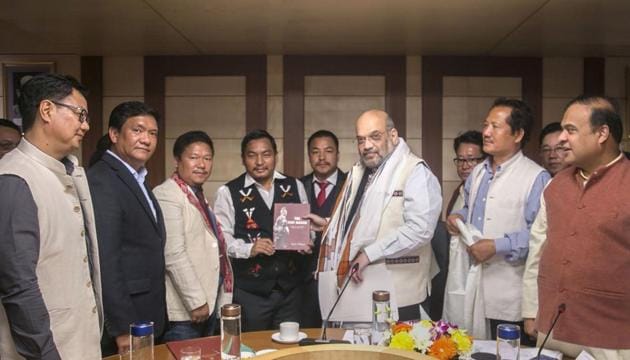Citizenship Amendment Bill, likely in Parliament next week, has a new cutoff date
Several northeastern states have flagged their concerns about provisions of the bill, suggesting that it was detrimental to the interests of the indigenous population.
Home minister Amit Shah met chief ministers and other prominent leaders of three northeastern states on Saturday to discuss the proposed Citizenship (Amendment) Bill, aimed at fast-tracking the grant of Indian citizenship to members of religious minorities from Muslim-majority Afghanistan, Bangladesh and Pakistan.

Several northeastern states have flagged their concerns about provisions of the bill, suggesting that it was detrimental to the interests of the indigenous population. For instance, in Assam, the proposed amendment has raised concerns that it would nullify the 1985 Assam Accord, which fixed March 24, 1971, as the cut-off date for deportation of all illegal immigrants irrespective of religion.
Similarly, there has been opposition in Mizoram because the amendment would make Buddhist Chakma refugees Indian citizens. Protests have taken place in Tripura and even Arunachal Pradesh against the proposed bill.
“The consultation with the home minister will help allay fears about the bill,” Assam chief minister Sarbananda Sonowal said.
The previous Lok Sabha passed this bill, but it wasn’t introduced in the Rajya Sabha and lapsed with the tenure of the lower house. The government plans to introduce a similar bill in the current session.
Assam minister Himanta Biswa Sarma said that even though most civil society groups had opposed the earlier draft of the bill, the redrafted bill will ensure that the interests of the Inner Line Permit-regime areas and the Sixth Schedule areas are protected.
The ILP regime is applicable in Arunachal Pradesh, Nagaland and Mizoram under the Bengal Eastern Frontier Regulation, 1873. In terms of Section 2 of the Bengal Eastern Frontier Regulations, 1873, citizens of other states require an ILP to visit these three states. The main objective of the ILP system is to prevent settlement of other Indian nationals in the three states in order to protect the indigenous population.
Under the Sixth Schedule of the Constitution, autonomous councils and districts were created in certain tribal areas in Assam, Meghalaya and Tripura. The autonomous councils and districts enjoy certain executive and legislative powers.
Sarma also said a separate legislation may be brought on the recommendations of a committee set up by the home ministry to look into the options of providing constitutional safeguards to the indigenous people of Assam.
“Shah assured the participants that the interest of the tribal population will be protected and certain areas may be exempted from the ambit of the bill,” a person present in the meeting said on condition of anonymity.
Shah also held separate meetings with Arunachal Pradesh chief minister Pema Khandu and Meghalaya CM Conrad Sangma. Union minister Kiren Rijiju and several MPs attended the meetings separately. Shah met leaders from Tripura and Mizoram on Friday and will hold the last round of consultations on December 3.
“It is a positive move as government has reached out to all concerned ... but there are more measures needed to protect the indigenous people of the north east,” Conrad Sangma said.
Former Arunachal Pradesh chief minister Nabam Tuki said the state opposed the 2016 bill but if the new bill excludes the ILP-regime states, it can be considered. President of the All Bodo Students Union Pramod Boro said the union had told the home minister that it opposed the CAB as it does not provide any safeguard to the tribal areas. “We want constitutional safeguards to the indigenous people,” he said.
Former Meghalaya chief minister Mukul Sangma said the bill will lead to a drastic change in the demography of the Northeast region and “foreigners” staying across India will move to the North-East to settle.
Only those who came to the country by December 31, 2014 will be eligible to apply for Indian citizenship. This means that keeping the concerns of various groups, automatic citizenship to those who came in from neighbouring countries will not be guaranteed.
One participant at the talks told HT that all applicants will be given six months to a year to submit their applications. “This will also ensure that each state will know how many people were applying to become citizens of their state,” the person said on condition of anonymity.
The home minister, who symbolically held the talks in Assam Bhawan over two days, instead of North Block, assured various groups that he will resolve issues like Clause 6 of the Assam accord that had set 1971 as the cut-off and promised to “preserve and promote the cultural, social, linguistic identity and heritage of the Assamese people.”
Get World Cup ready with Crickit! From live scores to match stats, catch all the action here. Explore now!
See moreGet Current Updates on India News, Budget 2024, Weather Today along with Latest News and Top Headlines from India and around the world.



